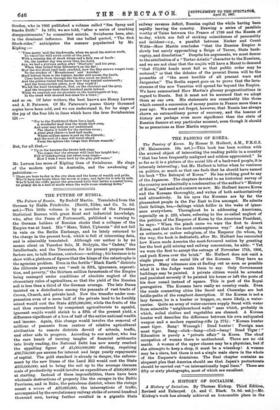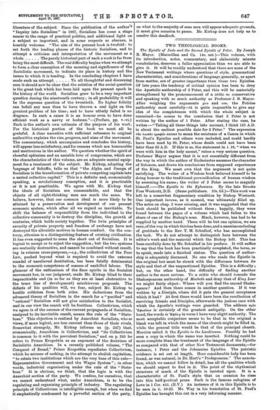A HISTORY OF SOCIALISM.
A History of Socialism, By Thomas Kirkup, Third Edition, Revised and Enlarged. (A. and C. Black. 75. net.)—Mr. Kirkup's work has already achieved an honourable place in the
Moisture of the subject. Since the publication of the author's "Inquiry into Socialism" in 1887, Socialism has come a stage nearer to the range of practical politics, and additional light on a subject so important, and in some respects so obscure, is heartily welcome. "The aim of the present book is twofold to set forth the leading phases of the historic Socialism, and to attempt a criticism and interpretation of the movement as a
whole The purely historical part of each a work is fat from being the most difficult. The real difficulty begins when we attempt to form a clear conception of the meaning and significance of the Socialistic movement, to indicate its place in history and the issues to which it is tending. In the concluding chapters I have made such an attempt To all thoughtful and discerning men it should now be clear that the solution of the social question is the great task which has been laid upon the present epoch in the history of the world. Socialism grew to be a very important question during the nineteenth century ; in all probability it will be the supreme question of the twentieth. No higher felicity can befall any man than to have thrown a real light on the greatest problem of his time ; and to have utterly failed is no disgrace. In such a cause it is an honour even to have done efficient work as a navvy or hodman."—(Preface, pp. v.-vi.) Such is the author's own estimate of the purpose of his work. For the historical portion of the book we must all be grateful. A clear narrative with sufficient reference to original authorities explains the rise, progress, and aims of the movement. The commentary, which accompanies and concludes the history, will appear less satisfactory, and for reasons which are honourable and meritorious in the author. We question whether the spirit of cheerful optimism and an amiable love of compromise, which are the characteristics of this volume, are an adequate mental equip- ment for a treatment of the subject. Mr. Kirkup, adopting the language of Schaffie, tells us that " the Alpha and Omega of Socialism is the transformation of private competing capitals into a united collective capital." This is a definite and, economically speaking, a revolutionary conception, and it is practicable or it is not practicable. We agree with Mr. Kirkup that the ideals of Socialism are commendable, and that the objects of all right-thinking men are much the same. We believe, however, that our common ideal is more likely to be attained by a preservation and development of our present economic system, which after all we regard as inevitable. To shift the balance of responsibility from the individual to the collective community is to destroy the discipline, the growth of centuries, which holds society together. The twin principles of security of private property and freedom of exchange have not destroyed the altruistic motives in human conduct. On the con- trary, altruism is a distinguishing feature of existing civilisation. It has even suggested to some the short cut of Socialism. It is logical to accept or to reject the suggestion; but the two systems are mutually destructive, and cannot be combined without result_ ing in ruinous cross-purposes,—e.g., the collectivism of the Poor Law, pushed beyond what is required to avoid the extreme scandal of unrelieved destitution, has been fatally detrimental to the economic competence of masses of unskilled labour. The glamour of the enthusiasm of the finer spirits in the Socialist movement has, in our judgment, made Mr. Kirkup blind to their impracticable and (in so far as they are at least obstructive to the, truer line of development) mischievous proposals. The defects of his qualities will, we fear, subject Mr. Kirkup to hostile criticism from both sides. His deductions from the advanced theory of Socialism in the search for a " purified" and `• rational " Socialism will not give satisfaction to the Socialist, and in our view the search will be fruitless. Collectivism, which we agree is of the essence of the current propaganda of Socialism, analysed to its inevitable result, means the rule of the " State- boss," This objection is realised by Anarchist Socialists, who se views, if more logical, are less current than those of their rivals. Somewhat strangely, Mr. Kirkup informs us (p. 247) that, economically, Anarchism is Collectivism, and "its Collectivism is common to it with the prevalent Socialism," and on p. 243 he refers to Prince Kropotkin as an exponent of the doctrines of Socialistic Anarchism. In a recently published volume, "The Conquest of Bread," Prince Kropotkin repudiates Collectivism, which he accuses of seeking, in the attempt to abolish capitalism, ".t,e retain two institutions which are the very base of this rule— Representative Government and the Wages System " ; in other w_ords, industrial organisatioq under the rule of the "State- boss." It is obvious, we think, that the logic ie with the Anarchist section of the party. We confess, for ourselves, that we cannot understand what, under Anarchism, is to be the regulating and organising principle of industry. The regulating principle of Collectivism is intelligible enough, but when we find it emphatically condemned by a 'powerful sweet]: of the party, on what to the majority of sane men will appear adequate grounds, it must give occasion to pause. Mr. Kirkup does not help us to resolve this deadlock.



























































 Previous page
Previous page